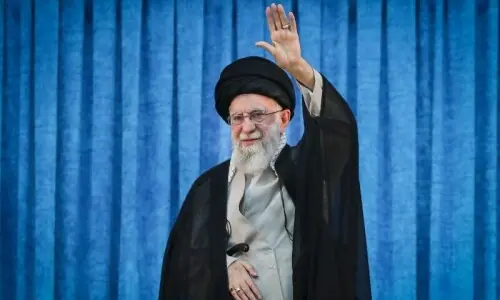KABUL: A group of Afghan men marched through Kabul on Thursday to draw attention to women’s rights by donning head-to-toe burqas.
The men marched under a leaden sky, with the bright blue burqas falling over their heads down to muddy sneakers and boots.
 |
| Male civil society members wear burqas to protest violence against women, ahead of International Women's Day, in Kabul, Afghanistan. — AP |
The demonstrators, associated with a group called Afghan Peace Volunteers, said they had organised the march ahead of International Women’s Day on March 8.
“Our authorities will be celebrating International Women’s Day in big hotels, but we wanted to take it to the streets,” said activist Basir, 29, who uses one name.
“One of the best ways to understand how women feel is to walk around and wear a burqa.”
The march by about 20 men drew a mixed reaction.
Traffic policeman Javed Haidari, 24, looked bemused and slightly annoyed.
“What’s the point of this?” he wondered. “All of the women in my family wear burqas. I wouldn’t let them go out without one.” Several of the men said wearing a burqa felt “like a prison”. They carried signs reading “equality” and “Don’t tell women what to wear, you should cover your eyes”.
 |
| Male Afghan women's rights activist pose for media as they wear burqas to show their solidarity to Afghan women ahead of International Women's Day in Kabul, Afghanistan. — Reuters |
Some men stopped to watch, laughing and heckling. Some were confused; others said women’s rights encouraged prostitution.
Some female passersby were also nonplussed. “We don’t need anyone to defend our rights,” said Medina Ali, a 16-year-old student wearing a black veil that showed only her eyes and woolly gloves on a cold morning.
“This is just a foreign project to create a bad image for the burqa and Afghanistan. They’re trying to make those of us who cover our faces feel bad.”
An older woman, who wore a burqa herself, was less affronted. “My husband and son tell me I should take my burqa off,” said Bibi Gul, who thought she was around 60.
“But I’m used to it. I’ve been wearing this for 35 years.”
Published in Dawn, March 6th, 2015
On a mobile phone? Get the Dawn Mobile App: Apple Store | Google Play
































